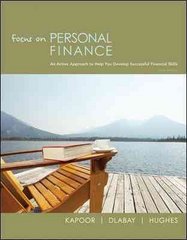Answered step by step
Verified Expert Solution
Question
1 Approved Answer
Question 1 California Public Emplovees' Retirement System ( CalPERS ) manages a pension fund for public sector employees in the state of California. CalPERS' assets
Question
California Public Emplovees' Retirement System CalPERS manages a pension fund for public sector employees in the
state of California. CalPERS' assets consist of contributions made by employers and employees. CalPERS invests the
contributions in order to generate the funds it needs to pay out retirement benefits in the future. With about
million participants in its pension fund, CalPERS' manages assets worth over $ billion and paid out
billion in benefits in
In CalPERS determined that it would target an expected rate of return from its investments of Suppose
CalPERS believes that the CAPM holds and adopts a simple approach toward constructing its investment portfolio to
achieve its expected return target it will only invest in the S&P index market portfolio and month treasury
bills riskfree asset The month Tbills are expected to yield ie the annual riskfree rate is and the
S&P index is expected to return more than the month Tbill yield ie the expected market risk premium
is
a What would CalPERS' portfolio allocation have to be portfolio weights ie what fraction of its portfolio
would it need to invest in the S&P index and what fraction would it need to invest in month Tbills in
order for it to meet its expected return target of What would CalPERS' portfolio beta need to be in order
to have an expected return of
b If the S&P index return has a volatility of ie roughly equal to the S&P index's historical
annual volatility compute the volatility of CalPERS' portfolio.
The month treasury yield increases to As a result of a potential decline in economic activity, S&P index is
now expected to return more than the month treasury yield ie the expected market risk premium is now
Lastly, as a result of expectations for increased inflation going forward and recent declines in the stock
market, CalPERS will now require a return of from its portfolio in order to meet its liability obligations.
CaIPERS decides to revise its investment approach as follows. It will continue to hold the S&P index market
portfolio but will no longer hold month Tbills riskfree asset in its portfolio. In addition to the S&P index,
CalPERS will now invest in a portfolio of either lowgradehighyield bonds junk bonds" or private equity. The S&P
index is still expected to have a volatility of and CalPERS has the following information on junk bonds and
private equity:
c What would CalPERS' new portfolio allocation portfolio weights have to be in order to achieve its required
expected return of if in addition to the S&P index CalPERS invested in:
i Junk bonds
ii Private equity
d Compute CalPERS' portfolio volatility in each case ie cli, and cii Should CalPERS invest in the portfolio
that includes junk bonds ci or private equity cii

Step by Step Solution
There are 3 Steps involved in it
Step: 1

Get Instant Access to Expert-Tailored Solutions
See step-by-step solutions with expert insights and AI powered tools for academic success
Step: 2

Step: 3

Ace Your Homework with AI
Get the answers you need in no time with our AI-driven, step-by-step assistance
Get Started


